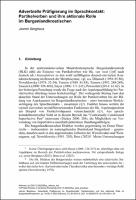Chapter Adverbielle Präfigierung im Sprachkontakt: Partikelverben und ihre aktionale Rolle im Burgenlandkroatischen
| dc.contributor.author | Berghaus, Jasmin | |
| dc.date.accessioned | 2023-11-27T17:12:46Z | |
| dc.date.available | 2023-11-27T17:12:46Z | |
| dc.date.issued | 2023 | |
| dc.identifier | ONIX_20231127_9791221501841_18 | |
| dc.identifier.issn | 2612-7679 | |
| dc.identifier.uri | https://library.oapen.org/handle/20.500.12657/85608 | |
| dc.language | German | |
| dc.relation.ispartofseries | Biblioteca di Studi Slavistici | |
| dc.subject.other | Particle verbs | |
| dc.subject.other | Burgenland Croatian | |
| dc.subject.other | language contact | |
| dc.subject.other | verbal aspect | |
| dc.subject.other | CCIP | |
| dc.title | Chapter Adverbielle Präfigierung im Sprachkontakt: Partikelverben und ihre aktionale Rolle im Burgenlandkroatischen | |
| dc.type | chapter | |
| oapen.abstract.otherlanguage | This article shows that particle verbs in Burgenland Croatian – a notable morphosyntactic phenomenon of language contact – may form aspectual pairs in a typically Slavic manner. Particle-based pairs with an indigenous base verb are formed by means of suffixation, suffix opposition, suppletion or prefixation. In the case of spatial relations, by contrast, preverbs predominate over prefixes, leading to a reduction of the old inventory of verbal compounds. Nevertheless, preverbs are only rarely obligatory in the formation of aspectual pairs. In the case of borrowings, only prefixation is productive, which might be attributed to German (and Hungarian) influence. On a par with other aspectual pairs, particle-based formations may express taxis relations (sequence, simultaneity, incidence). Language contact possibly contributed to the preservation of the Contextually Conditioned Imperfective Past also in imperfective particle verbs. | |
| oapen.identifier.doi | 10.36253/979-12-215-0184-1.05 | |
| oapen.relation.isPublishedBy | bf65d21a-78e5-4ba2-983a-dbfa90962870 | |
| oapen.relation.isbn | 9791221501841 | |
| oapen.series.number | 53 | |
| oapen.pages | 18 | |
| oapen.place.publication | Florence |

